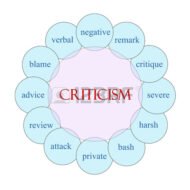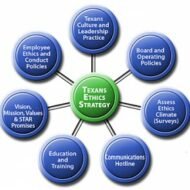Posted by Managementguru in Business Management, Decision Making, Principles of Management, Project Management, Strategy
on Jul 31st, 2014 | 0 comments

A goal has the word ‘go’ in it. Your goals should go forward in an unambiguous direction. However, goals are more about everything you accomplish on your journey, rather than getting to that distant point. Goals will often go into undiscovered territory and you therefore can’t even know where the end will be.

Posted by Managementguru in Human Resource, Organisational behaviour, Principles of Management
on Mar 17th, 2014 | 0 comments

Criticism Makes You Stronger and Sharper “Flattery is telling the other person precisely what he thinks about himself.” –Dale Carnegie “Criticism may not be agreeable, but it is necessary.”-Winston Churchill Critics are always feared for their barbed tongue and piercing comments. If you look at popular figures and celebrities, they tend to give much importance to these comments as they are real tools for self improvement and personal enhancement. Criticism helps improve knowledge, helps all the parties involved and helps one to learn and react to the actions of others. It is also a no-cost source of research that promotes a team spirit as well as a certain broad-mindedness / open mindedness of the human resources of an organization. It is a non-monetary tool of motivation. It helps in achieving organizational goals and objectives, also helps in realizing hidden mistakes, and tackles various bottlenecks. No doubt, it is a mixed blessing! Despite its benefits, it renders the following costs, which are the dark side of the coin: 1. It paves the way to enmity and hostility amongst those who frame policies and those who implement them. 2. It may lead to industrial dispute. It creates an unpleasant, undisciplined atmosphere in an organization. 3. It may result in unhealthy conflicts in an organization, undermining its human resources base. 4. It could also kill the spirit of initiative. 5. A superior may feel hurt or insulted when his subordinates / peers pinpoint his short-comings. Criticism can be made more positive on the following premises: 1. Do not perceive it as something bad or a shortcoming. If you feel it is unworthy of you, turn a deaf ear to it. 2. Give some time for the dust to settle down when someone is rude in his criticism as, with time, its impact will be diluted. 3. If you are criticized unfairly defend yourself and stand by your conviction. 4. Perceive it as a source of potential help in making wise decisions. 5. Do not arm the critic by counter attacking. That blows into a vendetta at times. 6. Do not raise your voice above the voice of critic – let him go ahead and be mild and amicable with him. Criticism is like the proverbial double-edged sword, and so can easily be made more effective as a potential business management tool by selecting leading and conductive spots where critics can come together and draw their views verbally / non-verbally, publicly or anonymously. Perceive critics as a vital source to help solve and implement solutions for the problems raised. Explore the critic’s view fully and freely, providing all sorts of ways in which critics can express their deliberations without...

Posted by Managementguru in Business Ethics, Business Management, Entrepreneurship, Organisational behaviour, Principles of Management
on Mar 15th, 2014 | 0 comments

The Origin of Unethical Behavior Ethical considerations in business are important to managers as it is to individuals in their personal lives. Personal life and business life cannot be perfectly separated with respect to moral judgements. A number of factors have been established as significant in making ethical standards a primary concern of business managers. What are Values? For the individual, the job is the centre of life, and its value must be, in harmony with the rest of life, if he is to be a whole and healthy personality. In an industrial society. The values tend to become those of the entire corporate culture. The public is insisting that business leaders are, in fact, responsible for the general social welfare and that the manager’s responsibilities go far beyond those of running the business. Even if the manager insists on a narrow definition of his role as possible, it is, however, essential that he takes these intangibles into consideration since they are the real motivating force in an organization. Expectations of the Society: If an organization did not behave in accordance with the social systems and expectations, it may not merely lose its market share but face another piece of legislated control and might also lose its very right to exist. Many a times managers may be forced to compromise their personal ethics and moral values in order to achieve organizational goals. Everyday ethical decisions are usually made between the lesser of the two evils rather than obvious right and wrong. Often it may be difficult for the manager to free himself from taking a biased attitude and look at issues objectively. In spite of good intentions, he becomes involved in the situation and it becomes difficult to retreat and take a detached point of view in examining the issue from an ethical standpoint. In the light of these problems, certain examples can be cited to answer the question as to what constitutes unethical behavior. Padding expense accounts to obtain reimbursement for questionable business expense. Revealing confidential information of trade secrets. Giving or accepting gifts or favors. Using company property and/or materials for personal use. Leaving the job without abiding by the sales contract. Being severely critical of competitors. Attempting to corner opportunities by bribing public officials. Price discrimination, unfair trade practices, unfair pricing etc. , Dishonesty in fulfilling contracts. Politics inside the organization. Unless and until the professional manager puts the interest of the organization in front of his own, places the duty to the society above his duty to the organization wholeheartedly, there is no point in talking about ethics in theory. Though a number of firms spend their time, money and energy in formulating statements, in reality their enthusiasm is lost in practice. The gap between the espoused and practiced values creates a dissonance in the minds of the people, and as a result in the...






